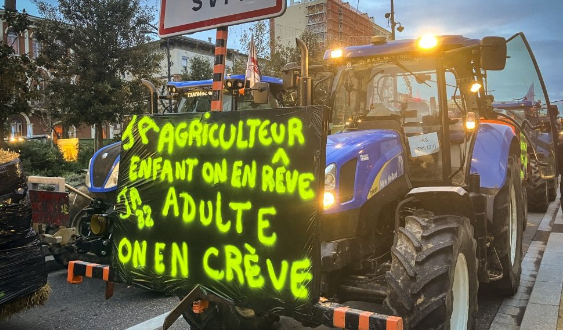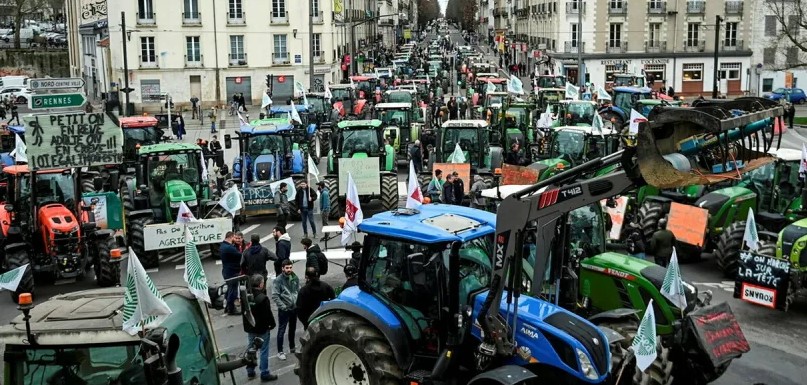This situation has worsened since October 7, 2023 and the Hamas attack on Israel, where the dominant discourse sees any mobilisation in support of the Palestinian people as an anti-Semitic attack and support for terrorism.
The war situation in the Middle East accentuates the authoritarian intervention of the French government with a position clearly defined by “the right of Israel to defend itself”. The government makes no reference to the atrocities suffered by the Palestinian population for decades, due to the policy of forced colonization of the region, while the whole world is aware of the crimes and genocide perpetrated against them by the Israeli government.
Fundamental freedoms are being attacked in France even by those who, not so long ago, advocated the preservation of democratic freedoms and the duty to block the far right. The reality is disguised. Part of the left, and in particular France Insoumise[1], is being demonized because of its refusal to call Hamas ‘a terrorist movement’. Everything is done to divide people and the world situation is used as pretext to impose new laws going against the fundamental freedoms previously defended.
THE “IMMIGRATION, INTEGRATION AND ASYLUM BILL”
The bill on ‘immigration, integration and asylum’ proposed by the Minister of the Interior, Gérald Darmanin, puts an end to the universality of rights and equality for foreigners. Its measures are more restrictive than in the previous laws. They lean in the direction of xenophobia like the “great replacement” (theory) posed by certain far-right movements and centred on the fight against Islamism. This authorises “national preference” for example, and the forfeiture of nationality. These are the measures dear to the National Rally[2]. They challenge land rights, and restrict the rights of residence, asylum and family reunion. Whilst these measures facilitate immediate expulsion, the termination of the right to medical aid and access to health, they limit at the same time the prospects for accommodation and the protection of minors.
The political crisis led to the arbitration of the Constitutional Council[3]which censored 35 articles of the law. But in fact, censorship only took place on what we call “legislative riders”, that is to say everything that was added by parliamentarians and with nothing to do with the aims of the initial document. The left hailed this as a victory, but what victory? Nothing was done to ease or reduce the tightening of the conditions of stay affecting the foreigners in France. The essence of these conditions, as Darmanin intended them, continued to figure in the text of the Bill.
The heated debates in the National Assembly on that Bill and the revision by the Constitutional Council did not prevent its promulgation on January 26; and with the support of the alliance of the right and the extreme right. This situation has brought an extreme political crisis: oppositions and fractures have opened up in the Socialist Party[4], the Macronist right and its Renaissance Party[5]. They have also opened up in the centrists of Modem[6], leading to several ministerial resignations. In some regions and departments, elected officials have declared that they condemn the laws of “national preference” and that they won’t apply those that restrict social benefits like the ‘autonomy allowance’, these being universal benefits.

Demonstration of migrants for their rights, in Paris, November 21, 2021
The support the Republicans[7] and the National Rally gave to this law was considered an ideological victory for the far right. But this does nothing to solve the problems of the world, with wars and the consequences of climate change leading to terrible human disasters, forcing populations to leave their original countries to find the means to survive elsewhere.
The xenophobic hatred underlying this law ultimately means the degradation of everyone’s rights. This situation gives visibility to the violent actions of extremist and neo-Nazi movements. These feel now empowered to act in broad daylight and with complete impunity. They caused significant damages in several cities; targeting mayors through attacks or harassment, pushing some to resign, or attacks on the locales of associations that defend migrants.
A ministerial reshuffle has occurred in this context of crisis. The new Prime Minister, Gabriel Attal, appointed 4 right-wing personalities to ministerial positions, instead of prioritising Macron and his Renaissance Party. This is further accentuating the sense of unease and political crisis within the majority[8]. Alongside with others equally opposed to the immigration law, around forty left-leaning deputies from the centrist Renaissance have distanced themselves. They now talk of creating a new parliamentary group which could be autonomous.
THE ANGER OF THE AGRICULTURAL WORLD
The assertion of the political right is not absent from the way the farmers’ anger has become exploited since the start of the year. The farmer movement is led by the dominant right-wing agricultural union, the National Federation of Agricultural Operators’ Unions (FNSEA), with the support of Young Farmers (JA). These demand the abolition of administrative standards and environmental regulations which they class as “punitive ecology” to caricature them. They want to review the Common Agricultural Policy (CAP) and the free trade agreements signed by the European Union. These views are expressed by large groups, multinationals of the agri-food industry, of mass distribution and the large owners. Add to this movement the Rural Coordination[9], more to the right still, which have perpetrated extremely violent actions against property and people.
The anger of the farmers is not new. It emanates from the European Union’s liberal public policies and directives which do not give precedence to the social questions, or to the fact that farmers must be able to live with dignity from their work. To break from this, there has to be another conception of society. This other conception wants it possible to redefine the relation between producers, processors and distributors; re-balance matters, cast productivism aside, improve on the conditions of debt, and on the working conditions in agricultural labour.
Concentration is at work in the rural world. More than 100,000 small farms have disappeared in France in the last ten years. Small structures cannot compete with large farmers who engage in intensive agriculture, such as large cereal and beet growers. Figures show that 20% of farmers live below the poverty line while the profits of the agri-food industry have more than doubled, from 3.1 billion to 7 billion euros.
Intensive agriculture uses pesticides to increase production, destroying ecosystems, killing biodiversity and everything that is alive, including the farmers themselves. These suffer from serious health problems with the use of phytosanitary[10] products, the pollution of the air and the water, and die prematurely from serious illnesses. According to an appeal recently launched by 13 mutual societies, 23 million French people suffer from chronic illnesses and cancers due to exposure to pesticides (60,000 tonnes used per year) but also to asbestos (200,000 tonnes still present today in the buildings).
There is a vital need for another policy around peasant agriculture, to make it possible to feed the population healthily, and on the basis of fair prices for farmers. This is what the Confédération Paysanne[11] and other associative structures defend. They look for the means to empower the young farmers who wish to establish new and more solidary working relations.

Mobilization of Young Farmers in France
In the middle of this (worldwide) agricultural crisis, the newly reshuffled government faces the roads blocked by tractors and slurry deposits by town halls, prefectures and administrative buildings. But its measures in response to the farmers go in the opposed direction to that wanted by ecological transition: return to the use of banned pesticides, pause in the Ecophyto plan[12], abandonment of the indicators making it possible to measure the doses of active substances used per hectare, reduction of the ‘appeal deadlines’ to two months against mega-basin installations[13], dumbing down of the administrative and environmental measures.
The farmers linked to the FNSEA have had part of their demands satisfied therefore, but at what price! It is the movements fighting for the environment that receive heavy legal penalties, particularly those opposed to the privatization of (natural) waters by these same farmers with the mega-basins. Some of these legal penalties can mean up to several years in prison, for daring to carry out actions meant to be non-violent. The double standards used here are the same that the government uses in its neoliberal policies, particularly in the case of the farmers’ mobilizations.
EUROPE AND THE APPROACH OF THE ELECTIONS
All this amounts to a significant step backwards in France. But the same happens also at European level, where the pressure from the right and the extreme right are hard at work. This shows in the way the “restoration of nature” project[14] is being undermined by a directive from the European Parliament itself: a proposal from the European Commission is reauthorizing glyphosates over a period of ten years, and a possible introduction in France of new generation of GMOs. These measures are backed by multinationals like Unilever, Nestlé, Coca Cola. Declared too restrictive by these large groups which hold power in the agricultural sector, it is the entire “Green Deal”[15] that is being called into question.
The capitalist interests are in control in this ambiance of crisis and lack of control of the situation. A situation where the population is revolting everywhere, leading many struggles for better living conditions and to counter the effects of climate change. Farmers are expressing their anger in a large part of the European countries: Germany, Poland, Romania, the Netherlands, Spain, Belgium. A press release from 6 European trade union centres reports an unsustainable situation that could compromise the survival of producers in the European Union.
In the run-up to the European Elections (6-9 June), it looks like at least for the moment, only the far-rights are able to campaign[16]. This is shown by the creation of alliances between far-right parties in several European countries – such as Italy, Spain, Poland, the Netherlands, Hungary and Slovakia – to try and win the maximum number of votes and seats in the European Parliament. Day after day, the polls insist that success in these European elections already belongs to the populist and far-right movements with a score that could reach around 30% of the votes.
The crisis is worsening in the context of war at the gates of Europe and the competition represented by imports of agricultural products from Ukraine which are causing prices to fall and affecting farmers’ income. However, Europe voted within the framework of a Defence Budget of 50 billion euros for arms for Ukraine. This happened with the support of large industrial groups, at the expense of social and environmental conditions, without the consent of parliaments and even less with that of the populations. And these same countries still dare proclaim themselves the sole defenders of democratic freedoms!
On 18 February, the Minister of the Economy Bruno Le Maire, announced immediate budget cuts in allocated credits amounting to 10 billion euros which affect all sectors – youth and community life, functioning of the State, national education, ecological transition, culture, etc. – to meet the aim of reducing the deficit and take into account “the new geopolitical context” of Ukraine and the Middle East. But he does not mention the cooperation agreement signed between France and Ukraine, following a G7 commitment at the last NATO summit, dedicating 3 more billion over 10 years in additional aid to Ukraine for its war against Russia.
The right follows in the footsteps of the far-right National Rally, which pursues two of its favourite aims: the fight against immigration and the fight against ecological transition. As Macron and his government do not hide their desire to further crank up the escalation of the war, one could expect a large number of reactions from left-wing parties. These reactions come slowly however. The great confusion they display in their positions comes from these matters not being of a geopolitical order any more, as they concern the strategy to bring down the capitalist system. And build another society based on the values of socialism.
Having found no agreement to lead a rallying list, the left in France is completely divided in these upcoming European elections. This gives the impression of a certain renunciation, while the crisis of capitalism has never been so deep.
The Posadists – February 29, 2024
Headline photo: Farmers blockade the city of Nantes on January 25, 2024
[1] La France Insoumise is a political party of the Left in France launched by Jean-Luc Melanchon in 2016 who was then a Member of the European Parliament.
[2] National Rally, is a far-right Party founded in 1972, commonly associated with Jean-Marie Le Pen, its leader from 1972 to 2011, and his daughter Marine Le Pen.
[3] Constitutional Council, was created in France under the Fifth Republic in 1958. It is a court with the power to review the constitutionality of new laws.
[4] Socialist Party, is a Party of social-democratic origins led by Olivier Faure. For decades the largest party of the French Left, it lost a lot of political weight in recent times. It has 31 deputies in the lower house. It is no longer part of the left-wing NUPES alliance after it suspended its participation. It is credited with 10% of voting intentions in the June 2024 forthcoming European Elections ballot.
[5] Renaissance Party: A liberal political party, originally known as En Marche, and later La Republique en Marche.
[6] Modem, is a bourgeois political party, with roots in the UDF. It has always supported centre-right governments since its creation by Valery Giscard d’Estaing.
[7] Les Republicans, is a liberal-conservative party that has preserved some traditions of Gaullism.
[8] Macron’s bloc falls short of absolute majority in the lower house. It lost its majority in the general elections of 2022. On that occasion, Macron won 234 seats, the left New Popular Union 141, and the National Rally 90. Next elections in 2027.
[9] Rural Coordination in France is funded under the European Agricultural Fund for Rural Development (EAFRD) and national contributions.
[10] Phytosanitary product: a compound of chemicals used by irradiation to devitalize certain plants, or seeds, or bulbs or cuttings. The aim is proclaimed to be for the protection of the world’s plants from pests. The Food and Agriculture Organisation (FAO) of the United Nations produces guidelines.
[11] Confederation Paysanne: This is a national trade union in the countryside. It is larger than the FNSEA, the JA and the Coordination Rurale and Modef. It has an elaborate programme against hyperproduction and hyper-concentration at the expense of human health.
[12] The government of France has suspended the “Ecophyto 2030” plan. This plan was to shift agricultural production in the direction of the principles of agroecology. The use of pesticides was to be halved by 2030.
[13] The mega-bassines are artificial irrigation water reservoirs lined and covered in plastics. This excludes biodiversity. It is an appropriation by large companies of the natural waters. It specifically serves the agro-industrial installations that make intensive use of chemical fertilisers and pesticides, in the production – for example – of crops in need of much water, like maize; the latter most often being used as fodder for cattle reared intensively and industrially.
[14] The ‘Restoration of Nature’ project plans to restore habitats in EU countries where ecosystems in land, coastal, marine and freshwater habitats are in poor condition. The aim is to accomplish this goal in at least 30% of identified European Union habitats by 2030.
[15] The European Green Deal plans to transform the EU into a resource-efficient and competitive economy ensuring no net emissions of greenhouse gases by 2050 (info from Wikipedia).
[16] The far-right National Rally, RN, headed by Jordan Bardella is already campaigning for the European elections in June. The Macron Centrist alliance, led by Valerie Hayer, is very far from having as many European candidates as RN. Macron accuses RN of ‘flirting with Putin in Ukraine’. He places his opposition to Russia and support for Zelensky at the centre of his campaign.

















